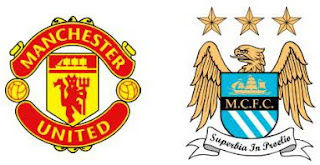 Our N&R team is now Man United and they come head to head this weekend with their local rivals Man City.
Our N&R team is now Man United and they come head to head this weekend with their local rivals Man City. Almost everyone knows about the Manchester derby, and whilst it may not match the air of malevolence that swirls round its Glasgow counterpart, and for years didn't even take place, in recent seasons this game has at long last rekindled some proper derby tensions. However I have done a bit of digging and whatever happens this weekend, the undercurrents will still not compare to the Manchester derby 104 years ago.
Newton Heath and Ardwick, forerunners of United and City, had first met in the FA Cup in 1891 and had grown along largely religious lines (Catholic United, Church of England City). They had co-existed happily, however, until the latter were involved in the first great football bribes scandal at the end of the 1904-5 season.
An investigation led to five of City's best players, including the game's first superstar, Billy Meredith, being banned from playing for the club again. Worse, they eventually went across the city and formed the backbone of United's first championship side in 1907-08. You can imagine the emotions pulsing through the 35,000 crowd at Clayton that day when Meredith, Herbert Burgess and Sandy Turnbull appeared for the enemy in a derby for the first time. Nani will have it easy by comparison.
Turnbull, a character designed to give managers grey hair, would later become the first player to be sent off in a derby. He was also banned sine die by the Football Association for betting irregularities and was killed serving in the Manchester Regiment in the trenches of Arras in May 1917.
Later the inter-war period is known as the yo-yo years in Manchester. United were relegated in 1922, 1931 and 1937 and City in 1926 and 1938, the last downfall setting a precedent for their "cock-up" reputation because the Sky Blues managed to lose their top-flight status despite being the division's top scorers with 80 goals. But while the clubs were slipping past each other in the League they did manage their only FA Cup semi-final, City winning 3-0 in 1926.
The post Second World War period saw a thawing of relations when City allowed their neighbours to use Maine Road for an annual rent of £5,000 because Old Trafford had been destroyed by the Luftwaffe. City's reserves, meanwhile, played at The Cliff, which was United's training ground until their recent move to Carrington.
But if there was a cordial landlord-tenant relationship through the Fifties - an atmosphere helped by the appointment of a former City player, Matt Busby, as United's manager - that was shattered in May 1963. Denis Law had gone from Moss Side to Trafford Park via Torino and, as if that was not intriguing enough, the clubs were locked in a First Division relegation struggle just a point apart at second and third bottom. Hard to imagine isn't it?
City were by far the better side in the early stages and went ahead after nine minutes through Alex Harley and had another "goal" disallowed for a hair's-breadth offside. Tempers were barely kept under control and before the interval Pat Crerand and Dave Wagstaffe were booked after an ugly confrontation.
Later it was revealed in the newspapers that Wagstaffe was laid out by an unnamed United player in the tunnel during half-time and perhaps that played a part in one of the most controversial climaxes to a Manchester derby. City were four minutes away from an important victory when Wagstaffe played a suicidal back-pass, Law nipped in and was brought down in the area by Harry Dowd. "It was a penalty," Law recalled in his autobiography. "The goalkeeper had hold of my legs, but I would never have scored. I was going away from the goal and had lost the ball. It was a lucky break for us."
It was an unlucky break for Dowd and his team-mates because Albert Quixall's penalty earned United a point that would mean the difference between their safety and City's relegation at the end of the season. Worse, as far as Maine Road was concerned, Law would be the outstanding player when United won the FA Cup final 3-1 against Leicester City a few days afterwards.
City would gain ample compensation five years later when their 3-1 win at Old Trafford proved pivotal as they finished two points ahead of their great rivals to win the 1968 championship, but the ultimate revenge came in 1974.
Tommy Docherty had sold the now veteran Law back to Maine Road, but United were scrapping to avoid relegation when City arrived in April. Little happened until the 81st minute when Colin Bell found Francis Lee who, in turn, passed to Law. His position, with his back to goal near the penalty spot, was not promising but with typical impudence the former "King of Old Trafford" brilliantly back-heeled past a startled Alex Stepney. In old television pictures the following is legend (watch here) Law made to celebrate, realised what he had done, then walked, head bowed, off the pitch and down the tunnel, leaving the game to go on for a few minutes before a second crowd invasion brought it to a premature end.
His last touch in League football, which virtually ensured United's relegation, had been his saddest. "It was no more than a reflex action," he said, "and I felt sick. I have never felt so depressed in my life as I did that weekend."


No comments:
Post a Comment